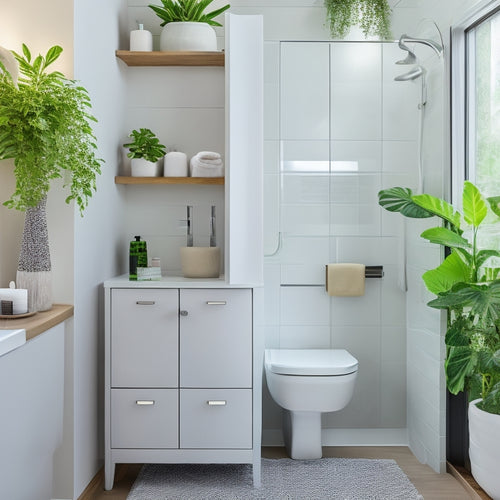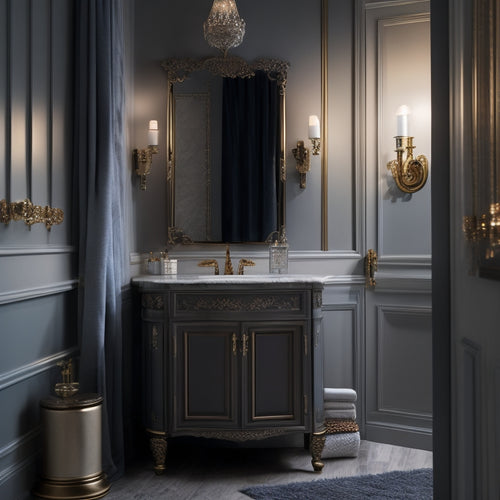
Home Improvement Tax Breaks Unveiled
Share
You can claim significant tax breaks for specific home improvements that meet certain criteria, with the average homeowner eligible to deduct up to $1,500 on their taxes. Energy-efficient upgrades, medical necessity modifications, and capital improvements increasing property value may qualify. However, regular maintenance, personal preference-driven improvements, and luxury upgrades typically don't qualify. You can also explore tax credits and incentives, such as the Residential Energy Efficiency Property Credit, and deduct home improvement loan interest if secured by the property. To maximize your deductions, maintain detailed records of your expenses and consult a tax professional - there's likely more you can tap into.
Key Takeaways
• Certain home improvements, such as energy-efficient upgrades and medical necessity modifications, can qualify for tax deductions.
• Not all home improvements are tax-deductible, including regular maintenance and repairs, and luxury upgrades.
• Tax credits and incentives are available for energy-efficient home improvements, such as the Residential Energy Efficiency Property Credit.
• Interest on home equity loans used for qualified renovations may be tax-deductible, but personal loans do not qualify.
• Accurate record-keeping is essential to claim tax breaks, including receipts, contracts, and invoices, and seeking advice from a tax professional.
Eligible Home Improvements Explained
You can claim tax deductions for certain home improvements that meet specific criteria, including energy-efficient upgrades, medical necessity modifications, and capital improvements that increase your property's value.
Energy-efficient upgrades, such as installing solar panels or energy-efficient windows, can greatly reduce your energy consumption and qualify for tax deductions.
Medical necessity modifications, like adding ramps or widening doorways for accessibility, may also be eligible for deductions.
Additionally, capital improvements that increase your property's value, such as adding a new roof or renovating a kitchen, can also qualify.
Non-Deductible Home Improvement Costs
Regular maintenance and repairs, such as replacing leaky faucets or fixing broken appliances, aren't eligible for tax deductions, as they're considered necessary to maintain a safe and habitable living space. You won't be able to claim these expenses on your tax return.
Additionally, home improvements driven by personal preferences, such as installing a new hardwood floor or adding a backyard patio, are also not tax-deductible. Luxury upgrades, like a high-end kitchen renovation or a spa-inspired bathroom, typically don't qualify for tax deductions either. These expenses are considered discretionary and don't meet the IRS's criteria for eligible home improvements.
It's essential to understand what expenses are non-deductible to avoid disappointment when filing your taxes.
Tax Credits and Incentives Available
Energy-efficient home improvements can qualify for valuable tax credits, offering a more significant financial incentive than deductions alone. You can benefit from these credits when you invest in renewable energy systems, such as solar panels or geothermal heat pumps. Additionally, you may be eligible for state rebates and local incentives for energy-efficient upgrades.
Here are three key tax credits and incentives to explore:
-
Residential Energy Efficiency Property Credit: Offers a tax credit of up to 26% of the cost of eligible renewable energy systems.
-
Nonbusiness Energy Property Credit: Provides a tax credit of up to $500 for eligible energy-efficient upgrades, such as windows, doors, and insulation.
-
State and Local Incentives: Research rebates and incentives offered by your state and local government for energy-efficient home improvements.
Remember to consult a tax professional to make sure you meet the eligibility criteria and follow the correct process to claim these tax credits and incentives.
Home Improvement Loan Interest Deductions
Understanding that interest on a home equity loan used for qualified renovations might be tax-deductible is important when financing home improvements. You'll need to make sure the loan is secured by the property to qualify for interest deductions.
Personal loans for renovations typically don't qualify. You should also consult a tax professional to understand specific rules on loan interest deductions. It's vital to maintain detailed records of loan funds used for eligible home improvements.
Loan eligibility and requirements are key factors in determining deductibility. Additionally, be aware of interest deduction limits, as they may vary.
Documenting and Claiming Tax Breaks
To guarantee you take full advantage of home improvement tax breaks, you'll need to maintain meticulous records of all expenses, including receipts, contracts, and invoices, as these documents serve as proof of eligible expenditures when filing your taxes. This record keeping will help you maximize your deductions and make sure you don't miss out on any potential savings.
Here are some essential tips to keep in mind:
-
Organize receipts and invoices: Keep all documents related to your home improvement projects in a safe and easily accessible place.
-
Track expenses by category: Separate your expenses into categories, such as materials, labor, and permits, to make it easier to claim deductions.
-
Consult a tax professional: Don't hesitate to seek advice from a tax professional or accountant to confirm you're taking advantage of all eligible deductions.
Frequently Asked Questions
Can I Deduct Home Improvements Made Before Buying a Home?
You can't deduct home improvements made before buying a home, as refund eligibility depends on ownership timeline; you must own the property when making improvements to qualify for tax deductions.
Do Home Improvements for a Vacation Home Qualify for Tax Breaks?
When you improve your vacation home, you might qualify for tax breaks if you rent it out and report rental income. The key is to prove property usage, so keep records of rental periods and expenses to deduct.
Are Home Improvement Tax Breaks Available for Inherited Properties?
'When you inherit a property, don't count your chickens before they hatch - tax breaks on home improvements depend on successfully managing the probate process and family dynamics, so consult a tax pro to make sure you're on solid ground.'
Can I Claim Tax Deductions for DIY Home Improvement Projects?
You can claim tax deductions for DIY home improvement projects, but only for material costs, not labor costs, as the IRS considers your time and effort as non-deductible personal expenses.
Do Home Improvement Tax Breaks Apply to Newly Constructed Homes?
When building a new home, you'll want to know that tax breaks typically apply to energy-efficient upgrades, not the initial construction cost. However, you might benefit from builder incentives or negotiate with the builder to include energy-saving features.
Related Posts
-

Waterproof Cabinet Storage for Small Bathrooms
Waterproof cabinet storage can revolutionize your small bathroom by providing effective organization while resisting ...
-

Freestanding Bathroom Cabinets With Hidden Compartments
You're on the hunt for a freestanding bathroom cabinet that conceals clutter in style. Look for one that provides amp...
-

DIY Hanging Baskets: Stitch, Store, Admire
To craft a DIY hanging basket, precision is key. Begin by cutting four fat quarters of fabric into rectangles and tab...


